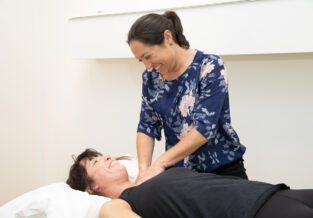Keep On Track: 8 Tips for Sticking to a New Exercise Plan
Published on
11 Jan 2016


Written by
Emma Martel (Lee)
Consultant Physiotherapist
Call us on: (03) 9975 4133
It’s early January, and that usually means a couple of things. The wild excess of the holiday period has finally come to a halt, the sun’s beaming down from way up in the clear summer sky, and sporting spirits are just as high.
After the New Year’s period, it seems like everyone’s out and about indulging in their newly discovered enthusiasm for exercising.
It’s great to see people decked out in brand new gear and with a fresh determination to make good on their fitness goals. But this newfound oomph can be infamously susceptible to old habits.
We all know the story: once regular routine kicks back in, it can be hard to keep on track (or treadmill) when it comes achieving exercise goals. That’s why we’re here to help, by making sure that the daily rigours of work and life don’t get in the way of your work out plan.
Here are our top tips for sticking to your new, New Year’s exercise routine. Even if you’ve been working out for a while, give these a shot and reinvigorate your program for the year ahead!
1) It’s better together
Working out in a group or with a friend is beneficial for a couple of reasons. Firstly, it adds some sociability to the activity – time flies when you’re chatting with a friend on your bike ride or jog. Secondly, you’re much less likely to disregard your plans if you have someone relying on you to show up. And of course, who doesn’t love a little bit of friendly competition?!
2) Sign up for something
An event, a team, a season in your favourite sport, anything. And always with a friend – for the same reasons as above. Signing up for something will also give you the impetus and motivation to work towards an achievement. You’re more likely to keep exercising when you’re pushing to complete a goal than when you’re simply working out, especially in the first instance of a new fitness program.
3) Record your progress
Time your pace per kilometre; measure your cholesterol levels; keep a diary of the changes in your physique, the way you feel throughout the day, or well how you sleep at night – the improvements you begin to notice can work as a daily reward and encourage you to keep pushing for even greater heights.
4) Enjoy your exercise
It sounds simple, but exercise is supposed to be enjoyable. Find a physical activity that suits your personality, physique, and that you like participating in – the second you start to start to feel bitterness towards your workout is the second you start abandoning it.
5) Mix it up for motivation
This one’s closely linked with the above – if you only ever work out in the same way, or at the same time, you’re more likely to tire of the activity and begin to resent it. It can be a simple change. For example, if you begin to dislike star jumps at the end of a circuit, do them at the start so that they’re out of the way and you can look forward to your favourite exercise at the end.
6) Small steps lead to success
There’s no point in trying to run a marathon after your first month of exercising. It’s important to be aware of your personal limits and push yourself accordingly. Over-exertion will lead to exhaustion or injury, both of which will impact negatively on your ability to keep regularly working out.
7) Pat yourself on the back
Make sure you take the time to enjoy your personal successes for what they are – exactly that. If your PB doesn’t stack up to someone else’s, don’t fret. Just keep on working and remember tip number 6: small steps will lead you to success if you keep them constant.
8) Visit a physio
We’ve got a wide range of other helpful tips and tricks to keep you motivated and keep you on track, but you’ll have to come in and see us for more! Physios can also advise you on correct technique, ensure your body remains in peak condition throughout your experience in training for an event or playing through a season, and help you avoid or manage niggling injuries.
So come on in and visit us in one of the PURE Physio clinics, we’d love to help you achieve your goals!
About the Author
Emma Martel (Lee) — Consultant Physiotherapist
Emma values the importance of listening to her patients to fully understand their symptoms and treatment goals. Through skilled biomechanical analysis of the whole body, her objective lies not only in treating symptoms but identifying the true origin of the problem and working with her patients to prevent future episodes of pain and injury.


